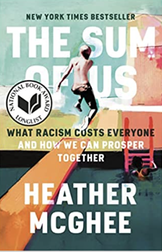 Be honest with yourself. Think about advancing in your organization. What’s your mindset, is it, ‘every person for themselves’ or ‘we’re all in this together?’ This is often referred to as an abundance/scarcity mindset. Where do these mindsets come from? During our CliffsNotes book club discussion on The Sum of Us: What Racism Costs Everyone and How We Can Prosper, by Heather McGhee, we examined this mindset through the lens of racism in America. (Many thanks to Kari Uman for facilitating!) The author approaches the discussion of racism not as a sociologist or anthropologist, but as…an economist! The Cost of Racism McGhee frames the discussion on the cost of racism on people of color and white people alike. For example, one observation McGhee makes is how the zero-sum paradigm is at play in racism in the U.S. Zero-sum is the notion that when one group wins, another loses. She shares numerous examples of how public benefits have been lost in recent decades. One compelling example is that of city swimming pools. In the 1950s, public pools were required to desegregate. In response, many communities chose to close the pools rather than open them up to all. As a result, many communities lost the benefit entirely. In their place, private pools opened, which are a benefit only to those who can afford the cost of entry/membership. So, imagine for a moment, you were child who grew up in a lower socio-economic neighborhood and experienced services either taken away from you or not even offered to you in the first place. Perhaps your parents applied for a loan to launch a new business or buy a house, but were denied over and over again. What might be your worldview as you grow up? For people who have not benefitted from abundance—people who have been treated poorly or less than for most of their lives—it is common to see a scarcity mindset show up in how they engage as leaders. This scarcity mindset may help you with being driven to succeed, but you will likely hit a wall once you move into a leadership role. (For more on abundance vs. scarcity, listen to this May 2023 episode of Freakonomics radio.) Why Leaders with an abundance mindset thriveFor leaders, an abundance mindset puts you in a posture of openness. Leaders with an abundance mindset look for win-win situations, trust others’ intent, and support creative solutions. From a people development standpoint, they build people up. Leaders with an abundance mindset joyfully share kudos and create opportunities for others to grow in their careers, etc. Their actions permeate the workplace culture and positively impact engagement overall. The question we raised in the book club discussion, is how do we help leaders who may have grown up feeling “lesser than,” for whatever reason, to help them adopt an abundance mindset? Case Study: Shifting from scarcity to abundanceIn working with leaders especially in coaching relationships, I invest time up front to understand where people are coming from. One of my introductory questions is, “What are the defining moments that have shaped who you are as a leader?” It is a question that leads to reflections on upbringing, early family life, dynamics at school, etc. One executive I supported a few years back came across as having a chip on his shoulder. He felt he always needed to prove himself, despite the fact that he was brilliant and had all the credentials and experience needed for his role. At his core, he felt he was never good enough. In getting to know him, I learned that he came from a family environment where his basic needs were not met. His family was poor and food insecure much of his childhood and adolescence. As an adult, he created a barrier with his team and peers. To help him make the shift from scarcity to abundance, I asked him to focus on two things:
Over time, his reputation shifted. He became known as someone who was collaborative, supportive, and inclusive. He built some strong relationships and truly connected with team members. His mindset shifted as did perceptions of him. Learn MoreRacism in America is a topic where continuous learning is needed. At Book Club, the group shared their most helpful resources for going deeper into racism and social injustice. We also updated our resources list, originally created in 2020. Check out the newly-added resources below.
WATCH
LISTEN
READ
DO/VISIT
0 Comments
Your comment will be posted after it is approved.
Leave a Reply. |
AuthorLaura Mendelow |
|
|
©2020. All Rights Reserved. Mendelow Consulting Group, LLC.


